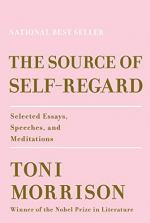
|
| Name: _________________________ | Period: ___________________ |
This test consists of 15 multiple choice questions and 5 short answer questions.
Multiple Choice Questions
1. In "God's Language," Morrison uses the word "ruminating" to describe what?
(a) Her admiration for Black women.
(b) Her contemplation of images.
(c) The kind of paradise revealed in her books.
(d) The prayers of her childhood friend.
2. In "The Site of Memory," Morrison says that slave narratives had two purposes: one was to record the life of an individual human being, and the other was what?
(a) To advance the cause of abolition.
(b) To rebut narratives by plantation owners.
(c) To condemn their former masters.
(d) To contribute to the historical record.
3. In "Grendel and His Mother," Morrison notes the significance of what characteristic of Grendel's mother?
(a) Her intelligence.
(b) Her lack of speech.
(c) Her size.
(d) Her capacity for forgiveness.
4. Why is "panoply" a clever piece of diction as used in "Unspeakable Things Unspoken"?
(a) It has a secondary meaning that has to do with arms and armor.
(b) It has negative connotations that support the irony in the essay's tone.
(c) It is another pun, echoing the essay's opening.
(d) It is part of the alliteration that creates rhythm in the passage.
5. In "The Source of Self-Regard," Morrison suggests that one reason that her work is widely taught is that it is what?
(a) Made to stand in for all of Black literature.
(b) A more intimate way of reading history.
(c) Challenging to younger readers.
(d) Filled with reflection on contemporary social issues.
6. In "Hard, True, and Lasting," Morrison says that what feeling is the first one writers feel when they begin to write?
(a) Love.
(b) Separateness.
(c) Gratitude.
(d) Independence.
7. In "The Site of Memory," Morrison says that a large part of her "literary heritage" is what?
(a) Fiction.
(b) The Western canon.
(c) Autobiography.
(d) Poetry.
8. In "Faulkner and Women," what does Morrison call the character of Sula?
(a) An artist.
(b) A delight.
(c) An adventuress.
(d) A conqueror.
9. In "Tribute to Romare Bearden," Morrison notes what about African American visual art?
(a) It has been criticized more rigorously and unfairly than the other arts.
(b) Its relationship to the other arts has received insufficient attention.
(c) It is more central to Blackness than other arts.
(d) It developed later than other arts, such as literature.
10. In "The Writer Before the Page," what does Morrison say she avoids in her writing?
(a) Figurative language.
(b) Musical language.
(c) Literary allusions.
(d) Symbolism.
11. In her "James Baldwin Eulogy," Morrison makes an allusion to what Biblical story?
(a) The visit of the Three Wise Men to the Christ child.
(b) The destruction of Solomon's temple.
(c) David and Goliath.
(d) Leviathan.
12. In "Invisible Ink," what word does Morrison object to when it is applied to reading?
(a) Pleasure.
(b) Art.
(c) Challenge.
(d) Participation.
13. In "Unspeakable Things Unspoken," Morrison introduces Rogin's commentary on Moby Dick for what purpose?
(a) To highlight the importance of Black scholarship.
(b) As an example of how a canonical piece can be enriched by reading for the Black presence.
(c) So that she can rebut Rogin's reading of Moby Dick.
(d) As part of her explication of the timeline of Western literature.
14. Morrison's novel "Paradise" is set where?
(a) In an unnamed kingdom.
(b) In New York during the Jazz Age.
(c) In Jerusalem.
(d) In an all-Black town.
15. In "The Source of Self-Regard," Morrison writes about not wanting to turn her readers into voyeurs. In this context, the word "voyeur" should be defined how?
(a) Someone afraid of encountering what is new or different.
(b) Someone who is more confident in their own knowledge than they should be.
(c) Someone who gets pleasure from watching something that is private or painful for others.
(d) Someone whose passion outweighs their judgment.
Short Answer Questions
1. In "Chinua Achebe," what does Morrison say she discovered at Africa House?
2. Morrison began Beloved after seeing what?
3. In "Hard, True, and Lasting," Morrison says that she can tolerate being alienated from the dominant culture because she knows what?
4. In "Faulkner and Women," what effect does Morrison say Faulkner has had on her writing?
5. In "Goodbye to All That," Morrison opens with an anecdote about asking an interviewer to omit all questions about what?
|
This section contains 751 words (approx. 3 pages at 300 words per page) |

|




